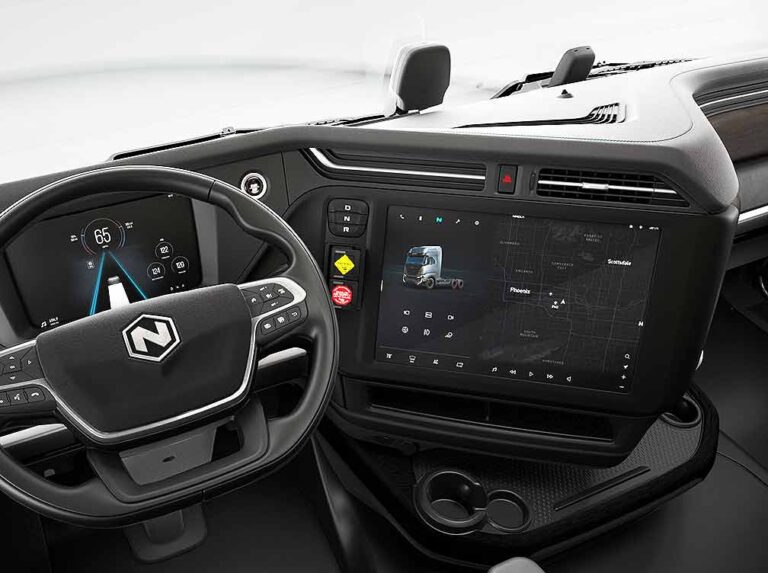DENVER — Roads in Colorado will soon be seeing green 18-wheelers — big trucks with plenty of power but zero emissions.
That’s the result of Nikola Corp.’s announcement Tuesday that it would begin selling its new Nikola Tre truck in Colorado through Wagner Equipment Co.
Colorado Energy Office Director Will Toor and Colorado Department of Transportation Office of Innovative Mobility Chief Kay Kelly on Tuesday joined officials from Nikola, Wagner Equipment and the Colorado Motor Carriers Association to hail the arrival of the electric big rigs.
A Nikola Tre truck, on display at the Capitol Tuesday, is a fully battery-electric vehicle offering a range of up to 350 miles. Beginning in 2023, Wagner will also include the Nikola Tre hydrogen fuel cell electric vehicles as part of its portfolio of trucks.
“Colorado recently released a draft Clean Truck Strategy, which is among the most comprehensive plans in the U.S. to build and scale the market for zero emission trucks,” Toor said.
“This strategy will reduce air pollution in our most vulnerable and polluted corridors across the state and help us achieve our climate goals. The strategy includes ambitious plans to transition to zero-emissions electric and hydrogen trucks and buses. It’s great to see the Nikola Tre here today as a real-world example of an electric heavy-duty truck.”
Medium-and-heavy-duty vehicles like tractor-trailers represent less than 10% of all the vehicles on the road but are responsible for 22% of on-road transportation greenhouse gas emissions as well as ozone precursors.
“It’s exciting to see zero emission products entering the heavy-duty market,” Kay Kelly, chief of innovative mobility at the Colorado Department of Transportation, said.
“The growing number of zero-emissions offerings in the medium and heavy-duty truck market are giving Colorado fleets more opportunity than ever before to choose clean, quiet trucks with lower operation and maintenance costs. Colorado’s comprehensive Clean Truck Strategy will further develop the supportive ecosystem necessary for fleets to be successful in deploying these compelling new products.”
Colorado’s Clean Truck Strategy would reduce greenhouse gas emissions from medium-and-heavy-duty vehicles by at least 45% in Colorado by 2050.
“Nikola applauds the state of Colorado for working to better understand the challenges and opportunities associated with transitioning fleets to zero-emissions,” Elizabeth Fretheim, Nikola’s global head of sustainability and social responsibility, said.
“As a company dedicated to the advancement of innovative zero-emissions truck solutions and the energy infrastructure required to make this feasible, we especially appreciate the focus on and recognition of the differences in the path forward for passenger cars versus medium- and heavy-duty trucks through the development of a specific Clean Truck Strategy.”
Electric vehicles not only offer zero emissions, but also the potential of cost savings. Currently for a daily route of 300 miles in Colorado, the cost to electrically charge the Nikola Tre is around half the cost of diesel fuel for the same trip. Charging an electric vehicle for personal use costs the equivalent of about $1 a gallon.
In the last three months of 2021, Colorado saw record-breaking EV sales; electric vehicles accounted for nearly 13% of new light-duty vehicle registrations in December. This precipitous increase puts the state on a trajectory to meet its 2030 targets: 940,000 light-duty EVs and at least 1,000 zero-emissions transit buses by 2030. The state is also leading by example, electrifying state facilities and setting the stage for the delivery of dozens of new electric state fleet vehicles in 2022 and 2023.
The Trucker News Staff produces engaging content for not only TheTrucker.com, but also The Trucker Newspaper, which has been serving the trucking industry for more than 30 years. With a focus on drivers, the Trucker News Staff aims to provide relevant, objective content pertaining to the trucking segment of the transportation industry. The Trucker News Staff is based in Little Rock, Arkansas.












how much do these trucks cost ? we have two electric transit buses, they have a two cylinder diesel engine to run air brake system and power steering system, are these trucks all electric ?
if not, you can not say they are 100% emission free, that would be a lie.
a million dollar truck, charging at 1 dollar a day, not including battery life deterioration and replacement, isnt saving money for a private trucker, then you have the charging stations.
440 volts into an array of charging stations doesnt go vary far, or to say cant charge 40 trucks all at once.
so for a fleet, it can work, however next you will have cities that ban any truck from entering city limits, unless it is electric. something los angeles and san franciso are working towards.
hydogen power is much better, but explosive.
I guess I understand the idea, but I am with you Benedict, I do not see the immediate cost savings after you have to factor in the other things. Yes, it may be less than diesel, but the tradeoff will be in time and convenience. As I imagine these new EV rigs costing significantly more than a diesel truck, the limitation of 350 miles alone will cost the entire economy millions in freight delays. Let alone the infrastructure needed to allow for charging (which we currently do not have). We have seen with Covid, that the prices for products go up when the demand is high. It is the law of economics. EVERYONE will pay for this change. I agree with reducing emissions but there are a lot of things (i.e. large factories), that are destroying our ozone more rapidly than a big rig. I can think of lot of ways to reduce emission in a rig and the first that comes to mind is less time idling. The wasted time driver spend idling in docks at shipper and receivers is ridiculous. That alone could make a significant improvement. Let’s eliminate the need for detention and then we can talk.